Since the 1970s the mainstream media, led by the Irish Times, have been using the term “island of Ireland,” and such variations as “this island,” when they need to refer to the whole of Ireland.
This is to avoid giving offence to those who cannot swallow the idea of Ireland being a country: they wish to apply that honour instead to the 26 Counties. Many people who really ought to know better have been repeating these terms ever since. Some, of course, are merely copying unthinkingly what they read or hear in the media.
The problem is reinforced by the fact that generations of schoolchildren have been taught pedantically that an island is any tract of land surrounded by water. This contradicts actual English usage: an island in fact is any such body of land that is not a country. Nobody says, “I was on Ireland,” as they would in speaking of an island, but “I was in Ireland”—showing that they are aware, even if subconsciously, of this distinction.
Such expressions as “all the people on this island” were contrived in order to fit a political agenda but have now been taken up by people who certainly do not subscribe to that agenda. That’s how linguistic manipulation works.
It fits in with the practice of referring to the 26 Counties as “Ireland”; and we can now read such expressions as “the border between Northern Ireland and Ireland.” A few years ago this would have been greeted with derision, or outrage; today it is almost a commonplace. And it didn’t happen by accident.
This is not a trivial matter. Language is one of the most powerful tools used by those in power to enforce, legitimise and normalise their control. When a deceptive or manipulative term is introduced (and there are many others), as soon as it is accepted by people generally, that battle is lost. But if we are armed with an understanding of this process we can fight back.
Ireland is not an island: it’s a country.






